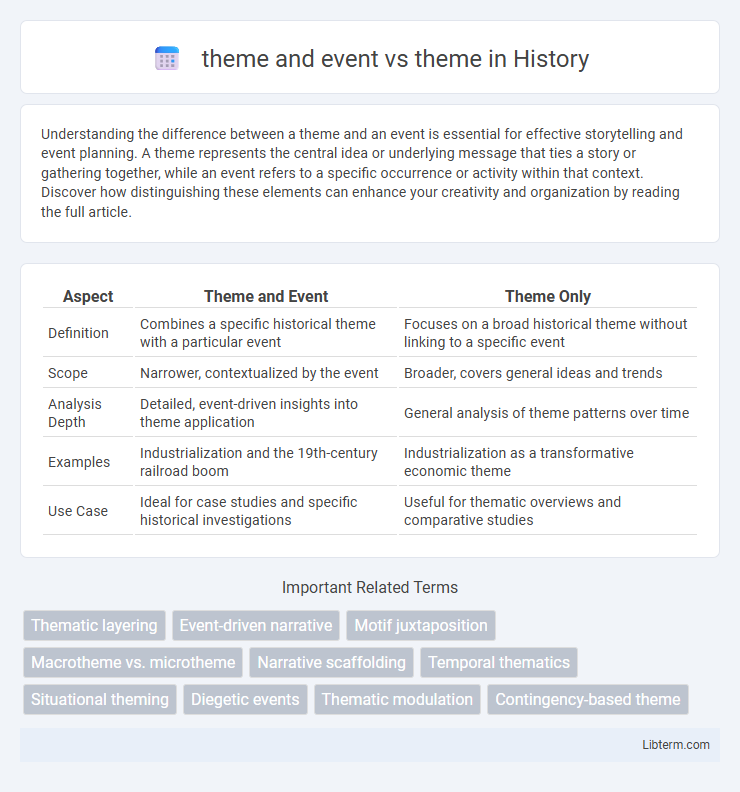Understanding the difference between a theme and an event is essential for effective storytelling and event planning. A theme represents the central idea or underlying message that ties a story or gathering together, while an event refers to a specific occurrence or activity within that context. Discover how distinguishing these elements can enhance your creativity and organization by reading the full article.
Table of Comparison
| Aspect | Theme and Event | Theme Only |
|---|---|---|
| Definition | Combines a specific historical theme with a particular event | Focuses on a broad historical theme without linking to a specific event |
| Scope | Narrower, contextualized by the event | Broader, covers general ideas and trends |
| Analysis Depth | Detailed, event-driven insights into theme application | General analysis of theme patterns over time |
| Examples | Industrialization and the 19th-century railroad boom | Industrialization as a transformative economic theme |
| Use Case | Ideal for case studies and specific historical investigations | Useful for thematic overviews and comparative studies |
Understanding Themes in Event Planning
Understanding themes in event planning enhances guest experience by creating a cohesive atmosphere that aligns with the event's purpose and audience. Selecting a theme involves identifying key elements such as color schemes, decorations, and activities that reinforce the event's message and evoke desired emotions. Differentiating between just having a theme and leveraging it effectively ensures that every aspect of the event supports engagement, brand identity, and memorable experiences.
Defining Event Themes vs. Standalone Themes
Defining event themes involves creating a cohesive narrative or concept that aligns with the specific purpose and goals of an event, enhancing attendee engagement through tailored experiences. Standalone themes, by contrast, are broad, versatile concepts not tied to any particular event, used primarily for branding or ongoing marketing efforts. Event themes require detailed customization based on factors like audience demographics, event type, and location, distinguishing them from the more generic nature of standalone themes.
The Importance of Theme in Event Success
Theme serves as the backbone of event design, shaping attendee experience and ensuring cohesive messaging throughout the occasion. Events anchored by a clear, compelling theme often see increased engagement, stronger brand recall, and a memorable atmosphere that resonates long after the event concludes. Prioritizing theme alignment with event goals directly impacts overall success by guiding planning decisions and fostering emotional connections with participants.
How Themes Shape Event Experiences
Themes transform event experiences by creating immersive atmospheres that engage attendees on emotional and sensory levels. Effective thematic design aligns visual elements, activities, and messaging to evoke specific moods and deepen participant connection. This cohesive integration elevates memories and drives meaningful interactions throughout the event.
Key Differences: Theme and Event vs. Theme Alone
Themes represent the underlying message or central idea conveyed throughout a narrative, while events are specific occurrences that drive the plot forward. A theme alone provides a broad conceptual framework, whereas combining theme and event offers a dynamic interplay between meaning and action, enriching the storytelling experience. Understanding the distinction enhances literary analysis, highlighting how events illustrate or challenge thematic elements.
Benefits of Integrating Themes into Events
Integrating themes into events enhances attendee engagement by creating immersive and memorable experiences tailored to specific interests or industries. Themed events improve brand recognition and cohesion, allowing organizers to communicate messages more effectively while fostering emotional connections with participants. This strategic approach also facilitates targeted marketing efforts, increasing event attendance and overall satisfaction.
Examples of Effective Event-Themed Concepts
Event-themed concepts maximize audience engagement by aligning activities with specific themes, such as a "Roaring Twenties" gala featuring jazz bands, vintage decor, and period costumes. Examples include a "Green Energy Expo" showcasing sustainable technology demonstrations, expert panels, and eco-friendly product stalls that reinforce the event's environmental focus. These immersive and cohesive themes enhance attendee experience by creating a memorable atmosphere that consistently supports the event's central message.
Challenges in Executing Event Themes
Challenges in executing event themes often arise from balancing creative vision with logistical constraints, such as budget limitations, venue compatibility, and audience expectations. Effective theme integration requires seamless coordination among vendors, technology, and decor to create an immersive experience that resonates with attendees. Misalignment between the chosen theme and operational execution can lead to reduced engagement and diminished overall event impact.
Tips for Selecting the Right Theme for Your Event
Choosing the right theme for your event hinges on understanding your audience's interests and the event's purpose to create a memorable experience. Consider factors such as venue compatibility, budget constraints, and desired atmosphere to ensure the theme enhances the overall event flow. Incorporate cultural relevance and trending concepts to engage attendees effectively while maintaining alignment with your brand identity.
Impact of Theme on Attendee Engagement
The impact of a well-chosen theme significantly enhances attendee engagement by creating a cohesive and immersive experience that resonates emotionally and intellectually. Events with clearly defined themes guide content, decor, and activities, fostering deeper connections and memorable interactions among participants. Tailoring themes to audience interests increases relevance, encouraging active participation and long-lasting impressions.
theme and event Infographic

 libterm.com
libterm.com